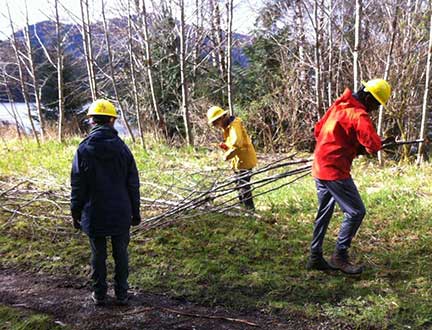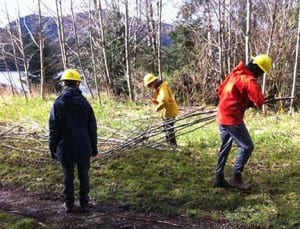In late March, students from Linfield College in McMinnville, Oregon, participated in an Alternative Spring Break on the Thorne Bay Ranger District. The program brings volunteers to Prince of Wales Island to help with community projects.
Forestry Technician Katie Rooks worked with the group. She says while many college students head to the beach for spring break, some choose other options.
“This is a special group of students that was more dedicated to learning and really wanted to come see Alaska and learn about sustainability.”
Rooks says sustainability was this year’s theme. She says that term can mean different things to different people. She believes in the Lower 48, most probably think of sustainability as recycling, composting and reusing. Rooks says it means something different in Alaska.
“Our sustainability has a lot more to do with things like having our own greenhouses, growing our own food, composting our own waste, being careful what we buy at the store, burning some of our own paper products instead of putting them in the garbage because it has to get shipped out of here and that’s not very sustainable. They came to learn how Alaska does it differently and to realize that Alaska does behave sustainably, especially within rural communities, more so than the rest of the country might see when they look at our somewhat consumptive natural resource reputation.”
Work included cabin maintenance, laying gravel at a day-use site, and cleaning up several garbage sites, among other projects. Rooks says the Forest Service also partnered with the Southeast Island School District. She says the Thorne Bay School produces its own vegetables and the school continues to expand its program. Rooks says one of the highlights of the week was building a coop to allow students to raise ducks and chickens to produce eggs.
“…that they’re going to use in their local restaurant that the school runs in Thorne Bay, and to teach kids about economics as well as producing their own food.”
Rooks says the Linfield students worked about 10 hours each day and are required to complete a certain number of hours in order to receive school credit. The Forest Service provides housing, food and safety gear during the week-long program. She says for only a few hundred dollars, the program receives about $5,000 worth of labor.
“It’s a win-win for everybody. The people who offer grants for this kind of thing, I think, are very impressed by what the students learn while they’re here, their reactions to what they see while they’re here, and the kind of thoughts that this experience provokes within them.”
This is the second year the U.S. Forest Service and Southeast Island School District have partnered with Linfield College. Rooks says the partners plan to continue the program next year.







